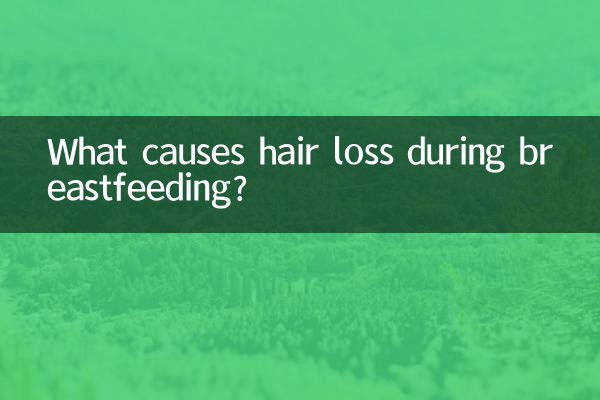What causes hair loss during breastfeeding?
Breastfeeding is a special stage that mothers go through, but many mothers find that they experience hair loss during breastfeeding. What is going on? This article will combine the hot topics and hot content on the Internet in the past 10 days to provide you with a detailed analysis of the causes of hair loss during breastfeeding and provide scientific and reasonable coping methods.
1. Main causes of hair loss during breastfeeding

Hair loss during breastfeeding is a problem that many mothers encounter. The main reasons include the following aspects:
| reason | Specific instructions |
|---|---|
| hormonal changes | During pregnancy, estrogen levels increase, hair enters the growth phase, and hair loss decreases; after childbirth, estrogen levels drop sharply, and hair enters the resting phase, leading to increased hair loss. |
| Nutrient loss | Breastfeeding mothers need to provide nutrition for their babies. If their own nutritional intake is insufficient, it is easy to cause the hair to lack necessary nutritional support. |
| lack of sleep | Breastfeeding mothers need to wake up frequently at night to feed. Lack of sleep will affect body recovery and hair health. |
| psychological stress | The stress of caring for a newborn can lead to endocrine disruption, further exacerbating hair loss. |
2. Scientific data on hair loss during breastfeeding
According to hot topics and medical research in the past 10 days, the incidence and related data of hair loss during breastfeeding are as follows:
| data item | numerical value |
|---|---|
| Incidence of hair loss during breastfeeding | About 40%-50% of breastfeeding mothers will experience significant hair loss |
| Peak period of hair loss | 3-6 months after delivery |
| Daily hair loss | The normal value is 50-100 strands, and it may reach 150-200 strands during lactation. |
| recovery time | Usually returns to normal within 6-12 months |
3. How to alleviate hair loss during breastfeeding
To address hair loss during breastfeeding, mothers can take the following measures:
| measure | Specific methods |
|---|---|
| balanced diet | Eat more foods rich in protein, iron, zinc, vitamin B and vitamin E, such as lean meat, fish, nuts, green leafy vegetables, etc. |
| Appropriate nutritional supplements | Under the guidance of a doctor, you can appropriately supplement iron, multivitamins, etc. |
| Maintain a good routine | Try to strive for fragmented sleep, and rest during the day when your baby sleeps. |
| Gentle hair care | Use mild shampoo and avoid excessive perm, dyeing and pulling of hair. |
| manage stress | Relieve stress through meditation, light exercise, etc. |
4. Does hair loss during breastfeeding require medical treatment?
Most hair loss during breastfeeding is a physiological phenomenon, but if the following conditions occur, it is recommended to seek medical treatment in time:
1. Abnormally large amount of hair loss, and the scalp is obviously exposed
2. Accompanied by other symptoms, such as extreme fatigue, dry skin, etc.
3. There has been no improvement for more than 1 year.
4. Alopecia areata or circular hair loss areas occur
5. Sharing of experiences of breastfeeding mothers
According to popular discussions on social media in the past 10 days, many breastfeeding mothers shared their experiences in dealing with hair loss:
| Experience sharing | Effect feedback |
|---|---|
| Use ginger shampoo | Some mothers reported that it has a certain stimulating effect on hair follicles. |
| Supplement black sesame products | The effect varies from person to person, but it is rich in nutrients |
| cut hair short | Lightens hair weight and reduces pulling |
| scalp massage | Promote blood circulation, helpful |
6. Professional doctor’s advice
Professional doctors remind: Hair loss during breastfeeding is mostly a temporary physiological phenomenon, and mothers should not be too anxious. Maintain a good attitude, pay attention to balanced nutrition, and ensure adequate rest. Hair will usually gradually recover after weaning. If you are really worried, you can consult a dermatologist or obstetrician, but do not use medications or remedies on your own to avoid affecting breastfeeding.
In short, hair loss during breastfeeding is a process that many mothers will experience. Understanding its causes and taking appropriate countermeasures can help mothers get through this special period better. Remember, take better care of yourself so you can take better care of your baby.

check the details

check the details